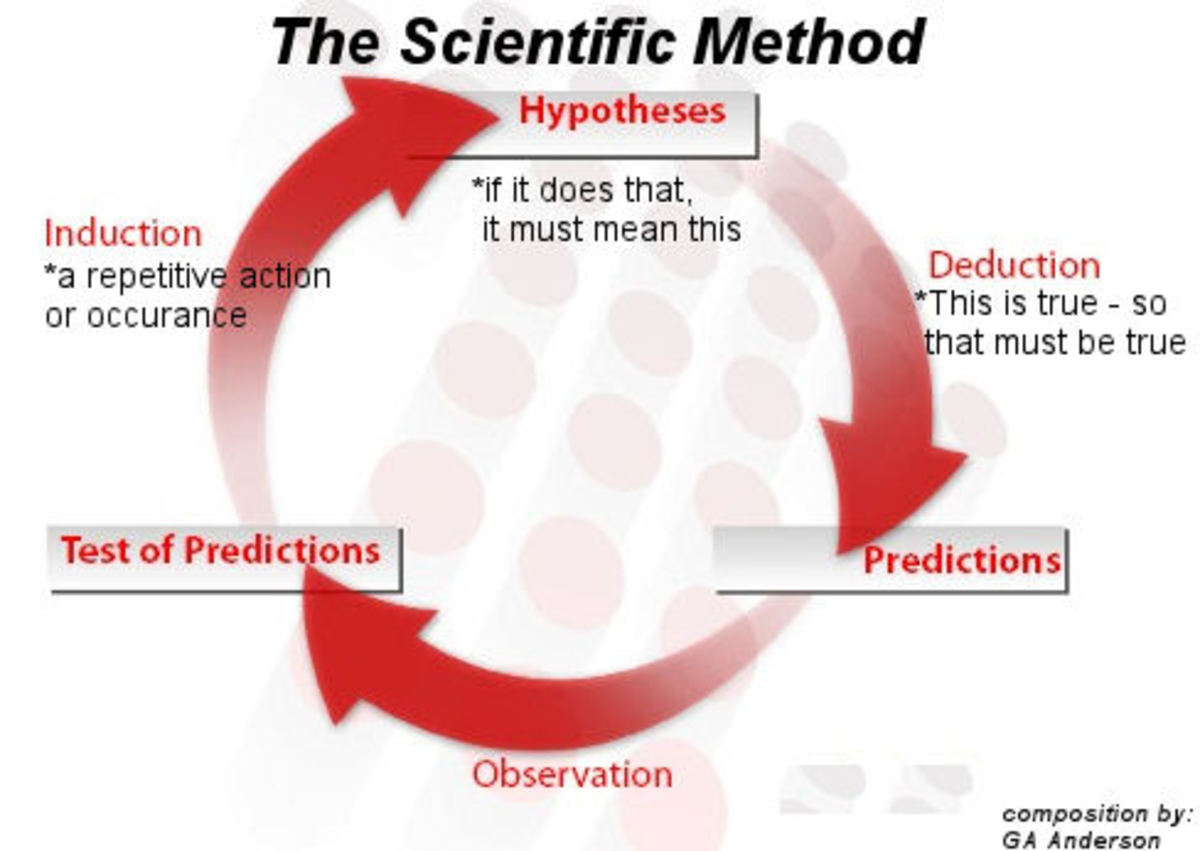The Scientific Method: The Logic of Deductive Reasoning & Inductive Faith?

Science, Philosophy & a New Religion?
Science can be defined as being the systematic study of nature,
based on experience and the observation of facts, and the association
between these facts. Chalmers(1976) identified the commonly held view
of science with the statement “Scientific knowledge is reliable
knowledge because it is objectively proven knowledge.” A popular
systematic approach to scientific research is the “scientific method”,
a basic recipe that scientists follow when developing their scientific
laws and theories. It is a process that has drastically changed our
knowledge of our world and the universe since its introduction in the
Seventeenth Century and has had the effect of distinguishing science
from other sorts of knowledge (such as philosophy or religion) as the
only reliable form of knowledge. Some of the main principles that
characterize the method are empiricism, induction, deduction,
prediction, and verification. Most scientists today conduct their
research using one or more of these distinguishing characteristics,
although there are those who question the reliability of the knowledge
that is produced by this method, and some who argue whether scientific
thought should be set apart from other sorts of knowledge,
particularly philosophical thought. Yet I wonder if (for us mere
mortal non-scientists) just how much difference there really is
between science, philosophy and religion.
The scientific method was designed, and its use
initiated, in the 1600’s by scientific revolutionaries such as Galileo,
Newton and Francis Bacon . These pioneers of a more modern view of
science argued that scientific knowledge should be based on experience
and observation (empiricism) and not on faith or intuition (which are
the basis for religious and philosophical thought), and its theories
derived from these facts by a combination of inductive and deductive
reasoning, rather than from entirely deductive logic. It was these
views that led them to develop the scientific method.
A typical recipe for the scientific method would be:
1.Observe - To obtain knowledge through observation and experience is called empiricism.
2.Hypothesize- To hypothesize is to suggest an explanation for an observed fact(inductivised generalizations).
3.Predict - Scientists predict what will happen and under what conditions(deductions) based on their hypotheses.
4.Verify - Scientists verify their predictions with experimentation.
5.Evaluate- Consider results of experimentation and predictions to determine whether the hypothesis was valid.
6.Publish- Allow others to test and verify results, and to improve original hypothesis.
For an idea or theory to be accepted as scientific
knowledge it must be tested repeatedly by experimentation and
consistently found to be true.
It must be able to be proven or unproven, a concept labeled
falsification by Karl Popper. This verification through experimentation
is one of the characteristics that supposedly sets science apart from
other forms of knowledge, such as philosophy and religion, or the arts.
There is no experiment in which ideas in philosophy can be proven to be
true, no method for determining what feelings an artist is trying to
express in a painting, and no way of concluding whether or not a poem
or song is correct. They cannot be falsified. They are considered to
be a representation of an individual’s personal opinion of reality (as
is any interpretation of them), and therefor not scientific.
This distinction between science and other
forms of knowledge is also evident when we look at how science
progresses. New discoveries in science expand or replace old theories,
whereas new works of art or literature do not replace old ones. The
scientific method uses both inductive and deductive reasoning in the
formation of scientific laws and theories. Inductive reasoning is a
process in which a generalization is drawn from particular experiences
or observations. Scientists use induction to form new theories.
Deductive reasoning is a process whereby a specific, logical conclusion
is drawn from general premises. Scientists use deduction to correct and
improve existing theories. It is therefore a combination of induction
and deduction that gives science the ability to progress and improve as
new ideas and theories expand or replace old ones.
There are those who would question the
reliability of the knowledge produced by these methods, in particular
the generalizations concluded by induction. The main argument is that
how can one justify generalizations that are based on a finite amount
of instances (Chalmers, 1976). The validity of this argument can be
seen if one thinks back to the conclusion that was prematurely drawn by
Europeans a few centuries ago that ‘all swans were white’. This
inductivised scientific "fact" was of course shattered by the discovery
of black swans in Australia.
On the other hand, we have deductive logic in
which a scientist will make a valid deduction based on a previously
inductivised generalization. The problem here is that the validity of a
deduced prediction is not dependent on whether or not the preceding
generalization is actually true. It could in fact be false in which
case the logically valid deduction would also be a false statement. In
contrast to this argument one could conclude that although there is no
guarantee that the knowledge produced by the scientific method and the
principles that characterize it is accurate, it is more than likely
that it is so (Chalmers, 1976). To be honest, this sounds a bit
philosophical to me.
So now we come to the question of whether scientific
knowledge and philosophical knowledge should be considered totally
separate forms of knowledge. Here I would like to point out a few
things:
1. Empiricism, which is considered to be the heart of the
scientific method, is the philosophical outlook of most scientists.
2. The “scientific revolutionaries” who devised the scientific
method were not all pioneer scientists. Sir Francis Bacon was indeed a
philosopher.
3. Scientists could not reach some of the conclusions drawn
from inductive reasoning without being somewhat philosophical in the
first place. Any assumption that cannot be falsified would have to be a
philosophical assumption, and many assumptions made by scientists today
are very hard to prove, especially ones made in the fields of physics
or cosmology.
To look at things a bit more seriously we can
consider the views of Richard Morris (1990) in his chapter on Physics
and Metaphysics. The main point he puts forward is that “philosophical
ideas do play a role in scientific thought, and are indeed sometimes
incorporated into scientific arguments”. He describes what he calls
“Strong and Weak Anthropic Principles”, defining them by quoting the
following statements made by British physicist Brandon Carter “What we
can expect to observe must be restricted by the conditions necessary
for our presence as observers”(weak principle) and “The universe must
be such as to admit the creation of observers within it at some
stage”(strong principle). He explains the first statement by saying
“In other words, if the universe did not have the properties it does,
we would not be here to see it” and the second by saying “In other
words, a universe that does not have the potential for the creation of
life is impossible”. Once again we see examples of scientific theories
that would be impossible to prove. I conclude that science and
philosophy are quite closely interconnected.
Science is a demonstration of man’s ability to think
logically. Its laws and theories are based on fact whether or not they
are factual in themselves. The use of the scientific method in the
production of these ideas gives science an edge over other forms of
knowledge, and will continue to do so whether or not scientific
knowledge is accepted as being reliable. Scientific progress has led to
improvements in medicine and technology as well as advancements in
warfare, and has greatly increased our knowledge of almost everything
in the known universe. It has also affected philosophical thought, and
I dare say for some, religious thought as well. Science is a form of
knowledge beyond the grasp of most everyday people. Many concepts and
theories are too complicated for some to even consider trying to
understand. Instead we place faith in our superior minded scientists to
produce knowledge that we can rely on. To me this seems as though we
have inadvertently developed another religion, although I doubt many
would actually be persuaded to admit or accept this. So while there can
be no doubt as to the impact science has made on modern society, both
beneficial and detrimental, and no denying that the majority of people
place great faith in it (despite those who claim it cannot be
rationally justified), one must question how distinguishable it is from
other branches of knowledge such as philosophy and religion. After
all, to take a philosophical stance, I must say that scientists are
only human, and nobody is perfect.
Reference List:
Chalmers, A.F., “Inductivism: Science as knowledge derived from the facts of experience,” in
What Is This Thing Called Science, Brisbane:Queensland University Press, 1976,
pp. 1-21.
Dauben, Joseph W. , “Science” in The World Book Encyclopedia, 1988, vol.17, pp. 191-204.
Schagrin, Morton L., “Deductive Method” in The World Book Encyclopedia, 1988, vol. 5, pp. 84
– 85.
Schagrin, Morton L., “Inductive Method” in The World Book Encyclopedia, 1988, vol. 10, p 240.
Morris, Richard, “Physics and Metaphysics” In R.Morris, 1990, The Edges of Science, New York:
Prentice Hall, pp 209 – 223.
W.W.Bartley III, “Empiricism” in The World Book Encyclopedia, 1988, vol.6, p262.
Please Note:
All names in this article have been changed for legal purposes and to protect the privacy of the Author. Except where otherwise credited, or where text forms part of an external link, this article is under the following copyright:
Copyright © 2010 Mel Stewart, "safe-at-last", of Perth, Western Australia. All rights reserved.
All persons, places and objects shown in the images in
this hub are are shown for illustrative purposes only. They
bear no relation to any real person or event. All persons shown are paid models. Unless otherwise credited, all images are
under the following copyright:
Copyright © 2010 Mel Stewart, "safe-at-last" and Licensors Nodtronics Pty Ltd. All rights reserved.








